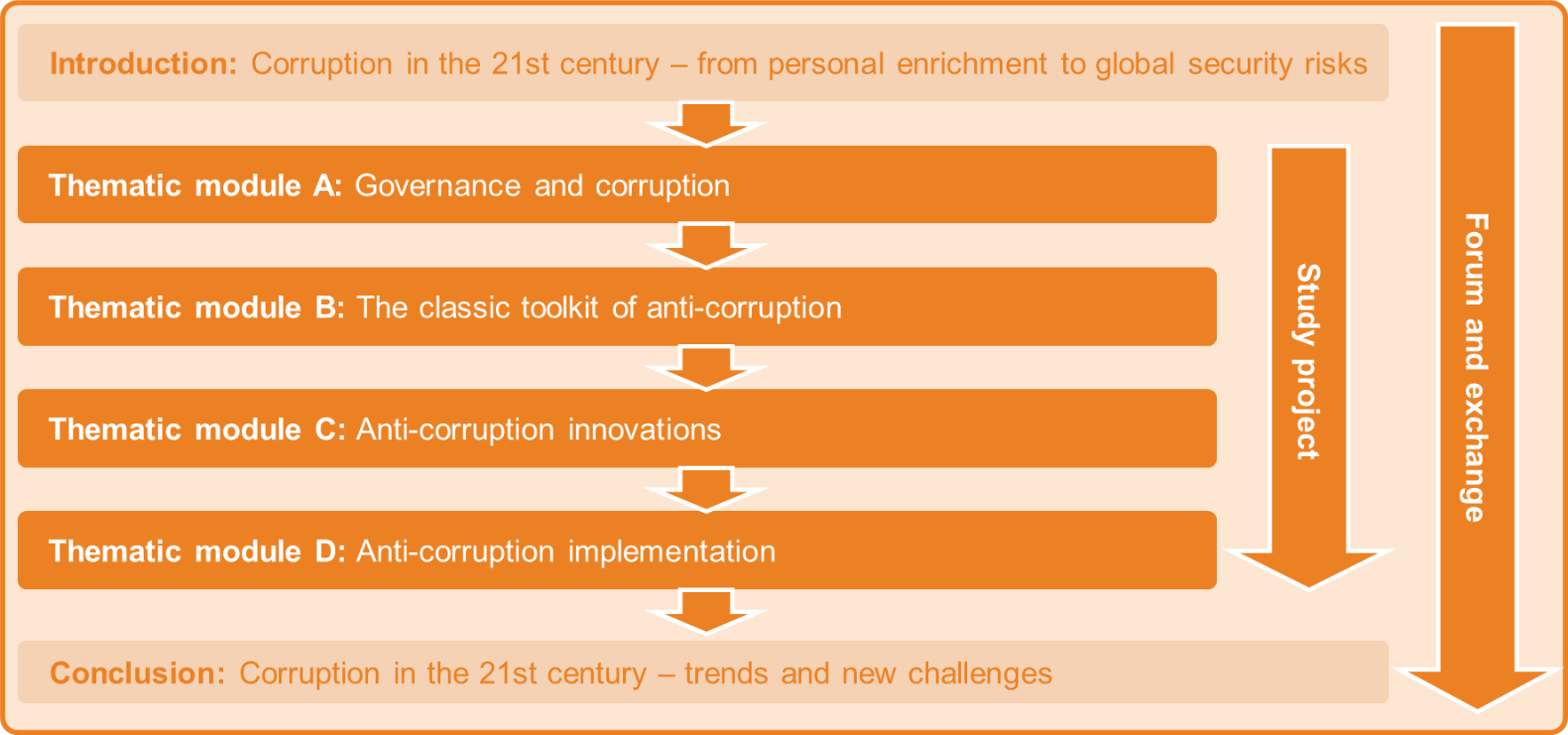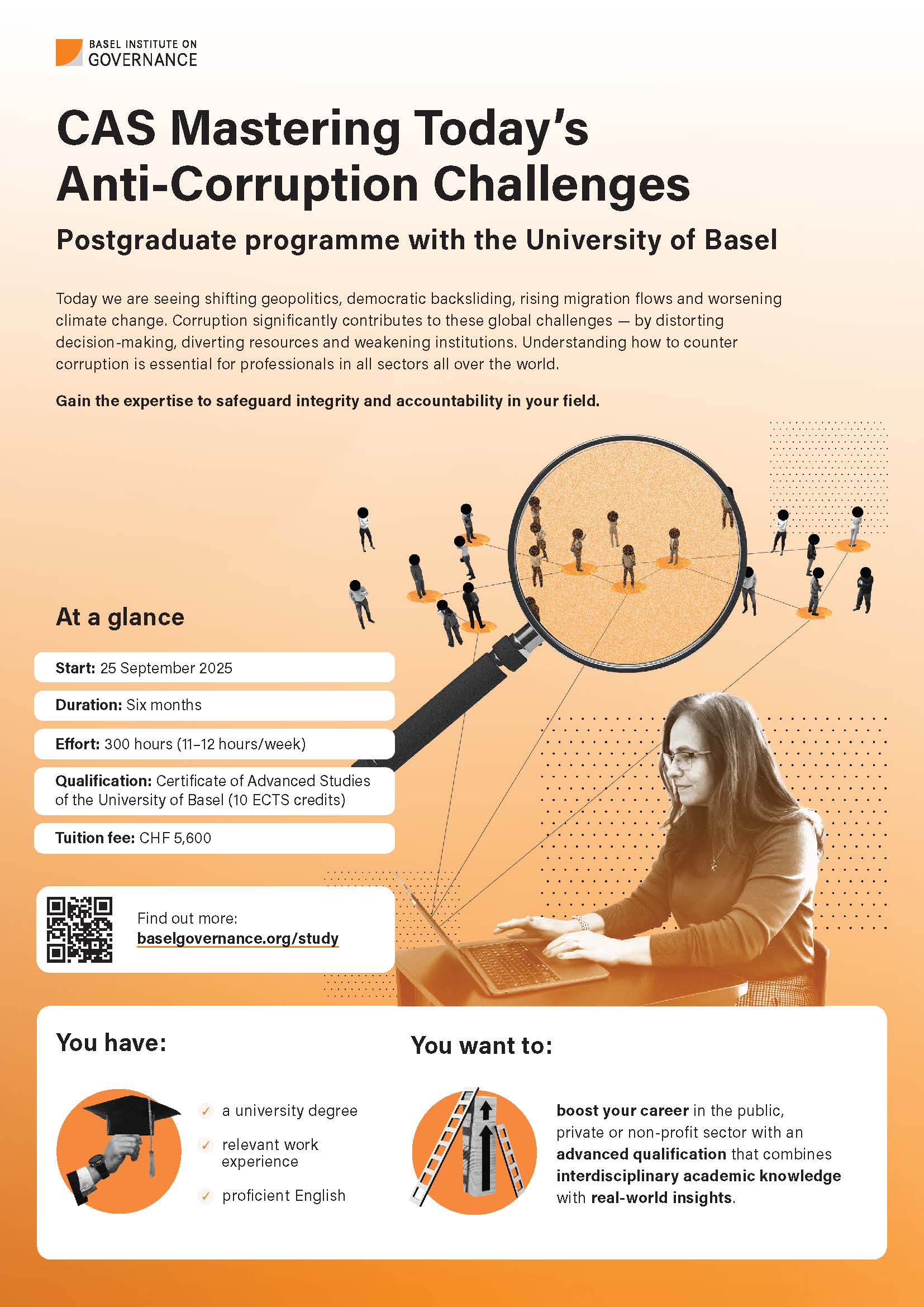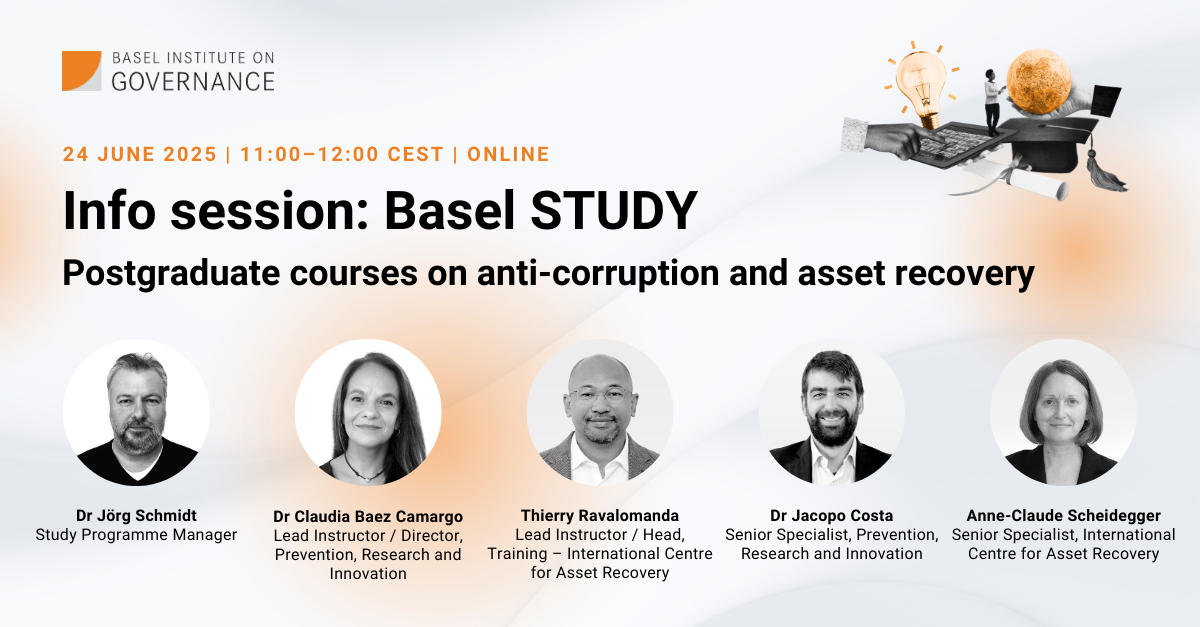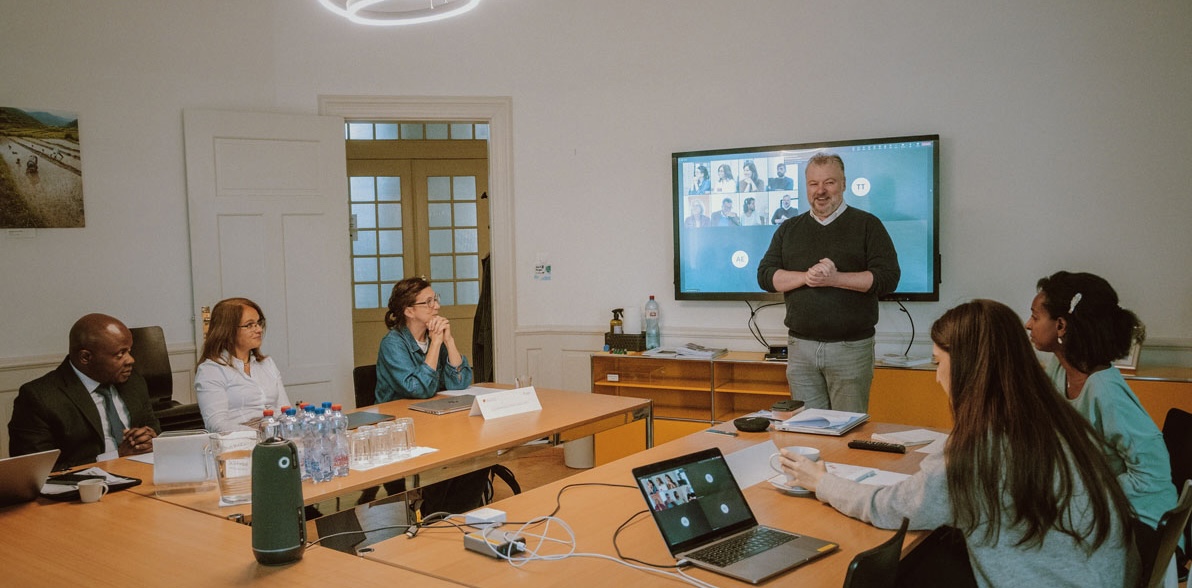Mastering Today's Anti-Corruption Challenges
Certificate of Advanced Studies
At a glance
- Next start date: 28 September 2026
- Duration: Six months (Sep 2026–Mar 2027)
- Effort: 300 hours (11–12 hours/week)
- Qualification: Certificate of Advanced Studies of the University of Basel (10 ECTS credits)
- Delivery: Live online sessions; 2 hybrid events in Basel (in-person optional); interactive learning material
- Tuition fee: CHF 5,600
+41 61 201 18 25
study@baselgovernance.org
Learn what works to counter corruption
From business to public service, healthcare to climate action, corruption distorts decision-making, diverts resources and weakens institutions. Understanding how to counteract these effects is essential for leaders across all sectors.
This six-month study programme with the University of Basel focuses on real-life corruption and governance problems. It:
- adopts a holistic approach to understanding corruption challenges affecting governance at different levels;
- is tailored to individuals working in the public and private sectors, civil society and the international community;
- will help you to understand and equip yourself with tools and approaches to promote anti-corruption and integrity in your daily work.
The course combines insights from political science, behavioural science, law and economics with experience derived from actual projects and cases. You’ll explore both long-standing tools and cutting-edge approaches to counter corruption in diverse contexts.
Designed for working professionals, the course blends online sessions, practical assignments and two in-person seminar events in Basel, which you can also join virtually. Through these you’ll strengthen your problem-solving, collaboration and leadership skills. You'll also enhance your ability to design evidence-based strategies to respond to the corruption challenges affecting your work and sector.
Mastering corruption and governance challenges isn’t just for specialists – it’s critical for professionals across industries who want to drive sustainable change.
Join us to gain the expertise you need to safeguard integrity and accountability in your field.
What you'll learn
The learning objectives of this programme are:
- Understand the multifaceted nature of corruption as it occurs today and its impact on states, societies and organisations.
- Interpret how corruption interacts with global social, economic, technological and geopolitical challenges.
- Analyse the benefits and limitations of common anti-corruption measures, based on real-world cases.
- Evaluate novel approaches and tools used to prevent and mitigate corruption.
- Create a tailored anti-corruption project for your professional context.
- Improve your collaboration, analysis, problem-solving, leadership and communication skills.
- Cultivate your credibility as an anti-corruption leader or specialist, and your capacity to connect with the global anti-corruption community.
Is this course for you?
This programme is aimed at individuals with a university degree and relevant work experience. It's ideal if you wish to advance your career by gaining a thorough understanding of the evolving nature of corruption and the tools that are needed to support better anti-corruption outcomes.
Because it is based on state-of-the-art academic and practitioner experience, this CAS represents a prestigious academic qualification on anti-corruption and governance.
It's especially targeted to professionals from:
- Government and public administration, especially regulatory, oversight and policymaking institutions.
- Law, including compliance, corporate law and human rights.
- Law enforcement and criminal justice, such as anti-corruption agencies, police, prosecutors and judges.
- Private sector, particularly specialists in compliance, anti-money laundering, ethics, governance and risk management.
- Non-profits and international organisations focused on governance, anti-corruption, accountability and transparency.
- Policy research and advisory fields, including think-tank analysts, consultants and professionals shaping governance strategies.
- Education and science, from academics and researchers to teachers.
- Journalism and the media, especially investigative reporters and editors.
It’s also a strong foundation for those with other backgrounds seeking a career shift.
We aim to bring together a diverse group of participants to foster rich peer learning alongside expert-led teaching.
Your instructors
Instructors include experts and academics from the Basel Institute and University of Basel, with contributions by specialists from different disciplines and sectors. This ensures a balance of academic knowledge and practical insights.
Leading the programme on behalf of the Basel Institute are:
Lecturers and other contributors in 2025
- Greg Power OBE, Founder and Board Chair, Global Partners Governance
- Prof Paul M Heywood, Emeritus Sir Francis Hill Chair of Politics, University of Nottingham; Visiting Professor, Centre for the Study of Corruption, University of Sussex
- Renee Kantelberg, Team Leader, MACCSS Project, Malawi
- Prof.asoc.Dr Valbona Karakaci, Regional Advisor for the Western Balkans, Helvetas
- Haytham Karar, Independent Researcher on Anti-Corruption and Security
- Prof Robert Klitgaard, University Professor, Claremont Graduate University
- Dr Lucy Koechlin, Chair of the Foundation Oumou Dilly
- Prof Alena Ledeneva, Professor of Politics and Society, School of Slavonic and East European Studies, University College London
- Mary Phombeya, Former Prevention Director, Anti-Corruption Bureau, Malawi
- Dr Joseph Pozsgai-Alvarez, Associate Professor and Program Director, School of Human Sciences, University of Osaka
- Jude Schönberg, PhD Candidate at the University of Basel; Affiliated Researcher of the Uppsala University Research Environment on Sexual Corruption
- Renne Traicova, Former Team Lead, Bulgaria at the Basel Institute on Governance
From the Basel Institute on Governance:
- Dr Peter Maurer, President of the Board
- Elizabeth Andersen, Executive Director
- Yuliia Brusko, Senior Specialist, Corruption Prevention
- Dr Amanda Cabrejo le Roux, Senior Specialist / Deputy Director, Green Corruption
- Alexandru Donciu, Specialist, Financial Investigations (Virtual Assets)
- Andrew Dornbierer, Head, Policy and Research ICAR
- Svitlana Lutsiuk, Senior Specialist, Corruption Prevention
- Oleh Mykhaliuk, Senior Specialist, Corruption Prevention
- Oscar Solórzano, Head, Latin America ICAR
- Scarlet Wannenwetch, Senior Specialist, Collective Action
Course structure
The six-month programme combines weekly live online sessions with an online forum for peer learning and reflection. Course materials, including texts, videos, case studies and quizzes, are easily accessible via the University of Basel’s platform.
The programme is structured into six modules: an introductory module, four thematic modules and a concluding module that brings everything together. A mandatory written online test follows each thematic module.
In addition, you will work on a personal study project throughout the course, allowing you to apply new knowledge directly to your professional context or areas of interest.
The programme opens and closes with in-person events in Basel – 1.5 days over a weekend – but you can follow these virtually if you prefer.

- Introduction: Corruption in the 21st century – from personal enrichment to global security risks
-
In the introduction, we jointly elaborate:
- a comprehensive and holistic understanding of corruption as a term and as a multidimensional phenomenon;
- how corruption connects with today's global challenges;
- how it manifests in the public and private sectors and its impacts on society, the economy and democracy; and
- the role corruption plays in the context of societal changes, technological developments and the shifting geopolitical landscape.
The programme starts with a 1.5-day seminar event in Basel. Participate in person and enjoy face-to-face networking with peers or join the classes over one day online.
- Thematic module A: Governance and corruption
-
The first thematic module is dedicated to exploring the relevance of governance in the public domain and in organisations. We will discuss what is usually associated with notions of good and weak governance and the consequences of various forms of corruption and related white-collar crimes.
The module considers impacts on states, societies and organisations in the context of societal changes, technological developments and the evolving geopolitical landscape.
- Thematic module B: The classic toolkit of anti-corruption
-
Module B presents the fundamentals of anti-corruption practice. The focus is on examining approaches that help the fight against corruption. We will deep dive into legal instruments from international conventions and multilateral initiatives to national laws.
We will look at approaches to enforcement, as well as how national laws and organisational policies help to address incentives and sanctions that raise the costs of engaging in corrupt activities. We will then focus on preventive approaches in both the public and private sectors.
- Thematic module C: Anti-corruption innovations
-
The focus of the third thematic module is on exploring how governments, societies and organisations can a) address and manage corruption risks; and b) support anti-corruption activities that effectively address the context-sensitive incentives and drivers that result in the persistence of distinct corruption patterns.
This module provides an overview of innovative approaches stemming from political and behavioural sciences. It covers the use of specific methodologies such as social network analysis and the development of technical innovations, including the use of AI tools, in the context of anti-corruption.
- Thematic module D: Anti-corruption implementation
-
The last thematic module synthesises key insights from the previous modules. Using an interdisciplinary lens, we will explore cases involving the implementation of innovative practical approaches to countering corruption, enforcing anti-corruption regulations and strengthening governance relevant to key (future) global challenges – from the energy transition to political polarisation and security concerns.
Drawing on international experiences, you'll develop practical strategies that work in today's complex environment.
- Conclusion: Corruption in the 21st century – trends and challenges
-
On the basis of our shared discussions and the presentations of your independent study projects (see “CAS project” below), we will summarise key issues and assess the usefulness and impact of available anti-corruption approaches and methods.
We will also address some specific perspectives on governance and anti-corruption such as gender and climate change aspects. We will convene an expert panel with representatives of leading organisations from different sectors to discuss future challenges of anti-corruption and venture forward-looking outlooks.
The programme closes with a second 1.5-day seminar event in Basel. Participate in person and enjoy face-to-face networking with peers or join the classes over one day online.
- Study project: Applying your knowledge
-
Your short individual study project is a central element of the programme and runs parallel to the thematic modules. In this project, you'll directly apply your newly acquired knowledge to a real-world corruption challenge of your choice – whether from your professional work or an area of personal interest.
Our instructors will give you the necessary guidance and you can discuss your progress with peers. At the end of the conclusion module, you will present your project to the class and submit a short report as a performance assignment.
- Forum and exchange
-
The forum and exchange module serves as a moderated online exchange and networking space for participants throughout the entire programme. Based on guiding questions from the team of instructors, you will reflect on the learning materials and relate your new knowledge to your own area of work.
In this module, we will also discuss relevant skills and career development in the field of anti-corruption that are helpful for you to take a next step. Participation in the forum complements the performance assignments and counts towards your total marks.
Blended learning approach
This programme is designed for professionals and offers flexible learning alongside work or other commitments. It features live online sessions with interactive group work, discussions and expert input.
Various methods and tools support your personal study, practical exercises, peer exchange and career development. Class sizes are appropriate to ensure active participation and networking opportunities.
Assessments and requirements for graduation
Upon completion, you’ll earn a Certificate of Advanced Studies from the University of Basel, equivalent to 10 ECTS credits. This reflects 300 hours of learning over six months. To graduate, you must:
- Attend at least 80% of live sessions.
- Pass all online tests at the end of each module.
- Actively participate in the forum.
- Complete and present your study project, including submitting a report.
Admission requirements
- Bachelor’s degree (or higher) from a university recognised by the University of Basel.
- 3+ years of relevant professional experience.
You should be able to invest around 11–12 hours per week in your studies, for a total of 300 hours over the six-month programme.
You will need to be proficient in English to actively participate in discussions and complete assignments.
Application process
To apply for the CAS Mastering Today's Anti-Corruption Challenges (28 September 2026 – late March 2027):
- Fill out the electronic application form with some basic information about you and your professional background. You will need to upload a motivation letter (1–2 pages), a resume/CV and copies of your degree certificates.
- Upon submission you will receive confirmation of receipt by email.
- We will review your application.
- If you meet the admission requirements, we will contact you to arrange an interview of around 30 minutes. This will help us to decide whether you can be accepted on the study programme.
- You will be informed about our decision either way.
- If you are accepted, you will receive an invoice for the tuition fee that you will need to pay by the communicated deadline.
Applications are reviewed on a first-come, first-served basis. Applications will close when the maximum number of participants is reached – so apply early!
Please also consider the time you might need to make visa and travel arrangements if you plan to attend the opening session in Basel in person.
Cost
The total tuition fee is CHF 5,600. This includes all costs for admission and registration, teaching, access to online platforms and course materials, and tests.
It does not include any of your personal study costs (for example internet access or printing) or any travel costs if you wish to join us in Basel for the in-person events.
Some employers can provide financial support for your professional development. Please check with yours! We are happy to help with the relevant documentation.
Official documents
View this course on the University of Basel website and download the official documents (in German):








